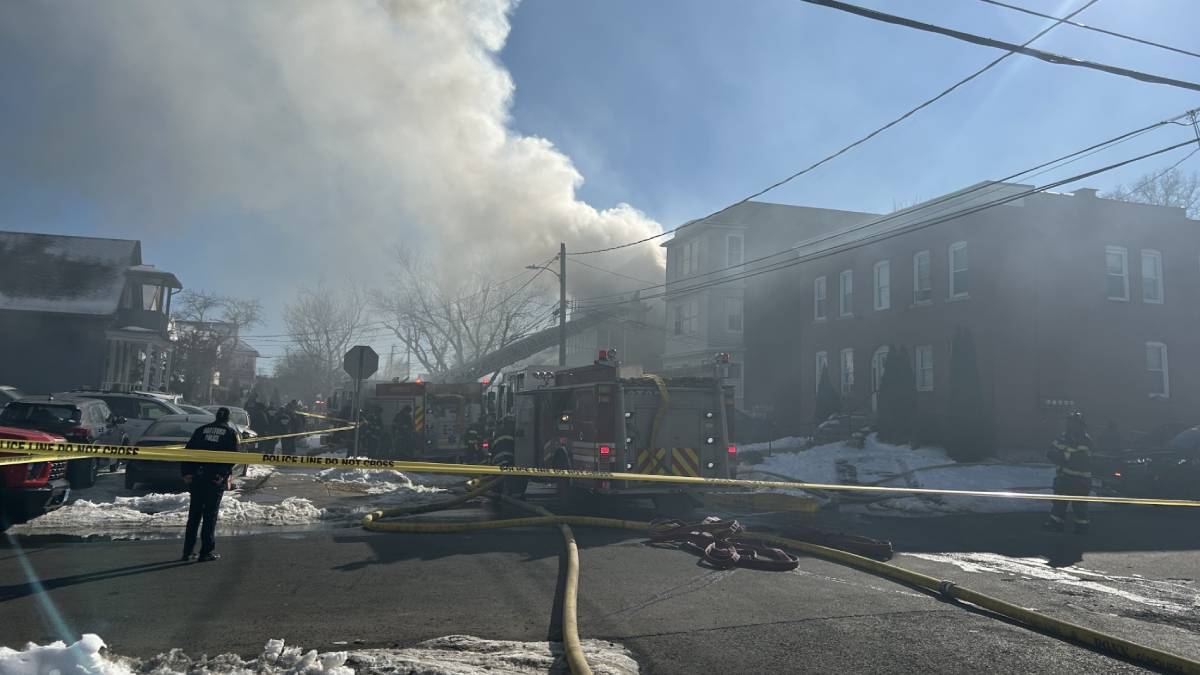After the deaths of two Beluga Whales that were transferred from Canada to the Mystic Aquarium in 2021, the aquarium says pathology reports show the deaths of those whales could not have been prevented.
Mystic Aquarium is defending its care of two beluga whales that died less than a year apart. Aquarium officials say pathology reports prove that both whales, transported to the aquarium last year from Canada, died due to diseases that could not have been prevented.
The whales were among five captive-born beluga whales transported to the aquarium on a research permit last year from Marineland in Canada, a zoo and amusement park that was overcrowded with more than 50 belugas at the time.
Friends of Animals, an animal advocacy organization, filed a lawsuit to try to stop the transport. They alleged that the beluga whales would be harmed as a result of the transport. A judge declined to issue an injunction.
In May of 2021, the whales made their journey across international borders. The transport was described as a massive undertaking and required years of planning, a military-style airplane, two federal governments, and a police escort. In the end, Mystic Aquarium hailed the transport as a success and said all five of the whales were healthy and doing well when they arrived.
Get top local stories in Connecticut delivered to you every morning. Sign up for NBC Connecticut's News Headlines newsletter.
Months later, in August, a beluga whale named Havok died. In February, a second beluga whale, Havana, died. A third beluga whale from Canada, Jetta, remains in critical care.
“It has been a really hard year,” Dr. Allison Tuttle, Chief Zoological Officer at Mystic Aquarium told NBC Connecticut in a sit-down interview. “It takes a strong emotional toll and then, beyond that just from the external perspective, constantly having your integrity questioned when you know you are working so hard and you are investing so much and doing the right things is also difficult.”
Since the deaths, research has been suspended at the aquarium. NOAA Fisheries continues to review the circumstances of the deaths and is coordinating with the U.S. Department of Agriculture, Animal and Plant Health Inspection Service (APHIS), which oversees the humane handling of captive marine mammals under the Animal Welfare Act.
Local
Animal rights groups have raised concerns and one organization has filed a complaint with the APHIS asking them to fine the aquarium over one of the whale deaths.
But the aquarium maintains that their team did everything they could to save the whales and says pathology reports prove that both of their deaths could not have been prevented.
Five-Year-Old Beluga Whale, Havok
Havok, a 5-year-old beluga whale, initially did well after transport, according to the aquarium’s chief zoological officer.
All of the whales underwent extensive pre-diagnostic testing prior to transport, according to documents filed with NOAA Fisheries, and were not identified as having any chronic health issues.
“The Canadian government reviewed the data and approved their export and we reviewed it on our end too and nothing stood out as abnormal. You have multiple entities on both sides of the border that approved this transport and no flags were raised,” said Dr. Allison Tuttle, Chief Zoological Officer at Mystic Aquarium.
While no chronic health issues were identified, Havok did have a medical history of gastric ulcers that delayed transport on two occasions to give him time to heal. According to Dr. Tuttle, gastric ulcers are common in beluga whales.
After arriving in Mystic on May 15, 2021, Havok’s appetite declined toward the end of June. His gastric ulcers returned, were treated, and then improved, according to an incident report that Mystic Aquarium filed with NOAA Fisheries.
In the middle of July, the veterinary care team noticed that Havok was losing weight fast, despite eating a lot. According to Tuttle, her team ran a slew of tests, looked at fecal matter, and accessed all parts of the G.I. tract that they could, but what they were able to see looked normal.
Tuttle said it felt like a mystery.
“There was clearly something wrong and he was receiving all the medications he could have, but unfortunately he ended up losing that battle,” said Tuttle.
Havok’s cause of death was determined to be lymphoplasmacytic enteritis, a gastrointestinal disease that prevented the absorption of nutrients.
NBC Connecticut asked an outside veterinary anatomic pathologist, with no connection to the aquarium, to review the report. Dr. Elizabeth Buckles, a professor at Cornell University’s College of Veterinary Medicine, explained that lymphoplasmacytic enteritis is rare in belugas and can often be a frustrating diagnosis.
“Because you can’t always tell what caused it,” said Buckles.
Tuttle said that her team consulted other beluga experts who also concluded that it was a very rare diagnosis.
“What we don’t know about this disease in cetaceans is a lot, but we do know that this type of disease could not have been identified, could not have been treated,” said Tuttle.
The Office of Laboratory Welfare, under the National Institutes of Health, wrote to the aquarium in January of 2022 saying in part that the office “understands that [Havok] died despite appropriate ongoing veterinary care.”
After Havok’s death, the US Department of Agriculture conducted a focused inspection of the aquarium and found three critical violations involving Havok’s veterinary care, his handling, and the facilities. The report found that the aquarium failed to provide adequate veterinary care in the last eight hours of Havok’s life.
Tuttle said that Mystic Aquarium is always striving to do the best for their animals, that they take the feedback and make improvements anyway they can, but they don’t agree with all of the findings.
“And it really felt like our integrity was being questioned amidst a very difficult time where we were providing world-class care and doing everything,” said Tuttle. “The vets were there within five minutes. I was one of them who responded, but unfortunately, he could not be saved. In my mind, we were on it.”
Tuttle said that, given Havok’s diagnosis, nothing would have changed his outcome.
“That’s the piece that stands out to me is that when you get a histopathology report like that, you are still devastated that the animal is not with us any longer, however, it is validating because it proves that we did everything,” said Tuttle.
Six-Year-Old Beluga Whale, Havana
Havana, a 6-year-old beluga whale, was one of the spunkiest and most energetic belugas that Marineland had, according to Mystic Aquarium. She did well when she first arrived in Connecticut, up until the fall when she started having issues navigating the pool.
According to an incident report filed with NOAA, Havana was moved to an off-habitat pool for closer monitoring and more directed medical support. Between November 2021 and February 2022, the aquarium reported that Havana received antibiotics and numerous diagnostics. Several veterinarians with cetacean expertise were brought in to consult on the whale’s case and ensure that everything was being done, according to the aquarium.
Havana died in February of 2022. A histopathology report determined her cause of death to be storage disease. According to Dr. Buckles, storage disease is also rare in belugas. She said that storage diseases are usually genetic.
Havana’s storage disease primarily affected her brain and spinal cord. Tuttle explained that the condition prevented normal things that get exported out of cells from getting exported. She said they accumulate over time and become apparent in an animal’s condition when they exceed a certain threshold.
“Even if we had known about the storage disease, there is nothing you can do to stop it, unfortunately. So we didn’t know it was there. It makes sense given the neurological behavior we saw, but had we known, there could not have been anything we could have done,” said Tuttle.
Stop Animal Exploitation NOW (SAEN), a national non-profit animal advocacy organization, filed an official complaint with the USDA asking them to open an investigation into Havana’s death. The complaint argued that the failure to diagnose Havana’s chronic illness led to her death.
The organization also cited a January 2022 USDA inspection report that found that coliform bacteria counts in Havana’s pool in December exceeded normal levels. The report noted that coliform changes may have contributed to one of the health issues she was experiencing.
Mystic Aquarium said that the diagnosis of storage disease required microscopic examination of brain tissue by pathologists.
Tuttle said that the team treated everything in Havana that they were able to identify and treat.
“Likely, if Havana had not been transported, she still probably would have died at that point just in a different location,” said Tuttle.
The Office of Laboratory Animal Welfare wrote in a May 2022 letter that its office “understands that despite receiving excellent care, [Havana] died of an unforeseen and unpreventable disease.”
"Nothing we could have done could have changed the outcome"
“Part of the business is animal births which are exciting and animal deaths which are sad, but dealing with two very unusual cases where so much investment was made and everything was done and still not having that successful outcome - it’s frustrating, it’s heartbreaking, it’s demoralizing and I think harder made so because of the questioning that comes with that,” said Tuttle.
The team at Mystic Aquarium described the deaths of Havok and Havana as “devastating”.
“There is nothing worse than working so hard, pouring your heart and soul into it and then having a different outcome than you’d hoped for,” said Laurie Macha, director of marine mammals and birds at Mystic Aquarium.
Tuttle and Macha maintain that the care teams did everything they could have to save the animals.
“I know 100% that there was nothing we could have done that could have changed the outcome. The pathology reports tell us that,” said Tuttle.
Tuttle said she still believes the research is “mission-critical.”
“It’s been a hard year, but the research that we are going to get from these animals has the potential impact to save wild whales that are critically endangered and that remains the most important thing,” said Tuttle.
What’s Next for Mystic Aquarium?
Research at the aquarium is suspended until NOAA Fisheries authorizes it to resume.
Since Havok’s death, the aquarium has expanded its team.
“We did increase our veterinary staff since that event and that’s only good for everybody,” said Tuttle. “So there are a lot of investments made in human resources that will continue to provide that strong quality of care.”
Jetta, another whale transported from Canada, remains in critical care. She has had changing health conditions since August of last year. According to Tuttle, Jetta has had some gastrointestinal motility issues, meaning there are times when the natural movement of her G.I. tract stops and they do not know why. The care team is treating her and constantly monitoring her entire body.
The two other whales from Canada are healthy, the aquarium reports.
Because a common link between the whale deaths is where the whales came from, Mystic Aquarium said that they have a research team in Canada working with a veterinarian who they contracted to help Marineland and look closely at the population of beluga whales there. They are hoping to learn information that they can apply to managing the whales from Marineland that are still in Mystic.
“I would want anyone who questioned our integrity to know how much heart that our team puts into this. There are people out there who just fundamentally are opposed to whales and dolphins being under human care and that’s anyone’s right…” said Tuttle. “And I want people to understand, too, how much of a toll this takes on our team.”



